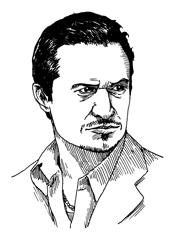In an industry where artistic recognition hangs upon developing a specialized, signature style, Mike Patton has built a vehement listenership through a steadily unfocused career. As a singer, he produces strained screams, expressive croons, lyrical glossolalia, rappy chants, and uses the wide range of extended vocal techniques most often heard in contemporary classical music. His first band, Mr. Bungle, which he cofounded while still a high schooler in Eureka, California, combined all these elements, often within a single track. On all three of their records, the group virtuosically plowed through a string of precise genre parodies—dissonant jazz, cartoon music, death metal, Middle Eastern and Hawaiian music, film scores, and more—each musical moment a surprise, even after multiple listens.
In the early ’90s, Patton achieved mainstream notoriety after he joined the peculiar hard-rock band Faith No More, whose pop-metal singles became staples of MTV during its music-video era. The group’s tortuous evolution inspired a generation of metalheads with omnivorous listening habits. Because of his work with FNM, Patton is sometimes cited as a founder of the rap-rock surge of the 2000s, a credit that incited his feud with the genre’s other progenitor, Anthony Kiedis of the Red Hot Chili Peppers.
Patton has been a frequent collaborator with saxophonist/composer John Zorn, an equally eclectic musician who produced Mr. Bungle’s first record and has released several of Patton’s solo recordings on his Tzadik label. Together, Patton and Zorn worked with the brutally experimental groups Naked City and Moonchild, and in performances of COBRA, an improvisational game in which players conduct each other with hand signals and cue cards. Their collaborations have singularly bridged the cavernous gap between avant-garde and pop audiences.
In recent years, Patton’s projects have become increasingly adventurous, as has his choice in collaborators: Bjork, Norah Jones, Massive Attack, Rahzel, and Dave Lombardo of Slayer. His newest project, Mondo Cane, is an album of orchestral covers of Italian pop music from the 1950s and ’60s, sung and arranged with loving sensitivity. He has also voice-acted in video games (Left 4 Dead, The Darkness) and in the Hollywood film I Am Legend. In 1999, he helped to found the label Ipecac Recordings, through which he continues to release his own projects—Fantômas, Tomahawk—along with a roster of artists who reflect his unpredictable tastes.
Patton and I spoke in the basement of the Believer office in San Francisco, where he lives. At the time of our conversation, he was moving in to a new house and finishing a score for Derek Cianfrance’s upcoming film, The Place Beyond the Pines.
—Ross Simonini
I. “WHAT DO I DO IF I DON’T KNOW WHAT I’M DOING?”
THE...
You have reached your article limit
Sign up for a digital subscription and continue reading all new issues, plus our entire archives, for just $1.50/month.
Already a subscriber? Sign in





